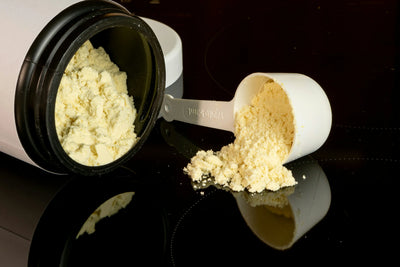Introduction
Skin allergies in dogs are often a headache for pet owners. It is heartbreaking to watch your dog scratch more than once because of itching, or even cause skin redness or infection. The first thing that comes to mind for many people when faced with dog skin problems is chemical medications, but these can sometimes cause side effects or discomfort.
Apple Cider Vinegar for Dogs: 5 Natural Ways to Treat Skin Allergies Fast
Fortunately, apple cider vinegar is becoming a popular choice for pet care as a natural, gentle alternative treatment. Not only is it affordable, but it's also effective in relieving your dog's skin discomfort. In this article, we'll give you a detailed overview of the amazing benefits of apple cider vinegar and share five practical ways to help your dog quickly regain healthy, smooth skin.
1. Apple Cider Vinegar
Apple cider vinegar is a fermented natural product that is rich in anti-inflammatory, antibacterial and antifungal properties. These properties make it ideal for treating skin allergies in dogs. Apple cider vinegar regulates the pH balance of the skin, creating an environment that is not conducive to the growth of bacteria and fungi, thus reducing the risk of infection. It is also effective in relieving itching and breaking the vicious cycle of further skin damage caused by scratching in dogs. In addition, apple cider vinegar gently cleanses the skin and removes irritants and allergens, bringing instant comfort to your dog.
Whether it's flea bites, eczema, or minor skin inflammation, apple cider vinegar can provide significant soothing effects without relying on chemicals. Its natural ingredients allow pet owners to feel more at ease, making it especially suitable for those looking for a gentle care option for their dogs.

2. Five Apple Cider Vinegar Natural Remedies
Here are five simple and easy ways to use apple cider vinegar to help you quickly relieve your dog's skin allergies. These methods are easy to follow and effective for home care.
Apple Cider Vinegar Anti-Itch Spray
Mix apple cider vinegar with water in the ratio of 1:1 and put it into a clean spray bottle. To use, gently spray on your dog's skin, avoiding sensitive areas such as eyes, nose and open wounds that may cause stinging. This spray not only provides quick relief from itching, but also effectively repels fleas, making it especially suitable for dogs with mild itching or seasonal allergies. After spraying, you can gently massage the skin to help the solution penetrate better. Use it 1-2 times a day for a few days, and you may find that your dog's scratching behavior is significantly reduced.
Apple Cider Vinegar Wet Compress
For localized skin allergies or areas with severe redness, a wet compress is a more concentrated treatment. Mix apple cider vinegar with water in a 1:1 ratio, soak a clean cotton cloth or gauze and apply to your dog's affected area. Keep the wet compress on for 3 hours or overnight (ensure your dog doesn't lick it), then remove and gently rinse with water. This method deeply soothes inflammation and is especially good for stubborn localized allergies or hot spots. When applying, watch your dog's reaction to ensure that the wet compress doesn't cause discomfort.
Apple Cider Vinegar Bath
Giving your dog an apple cider vinegar bath is a great way to improve skin conditions all over the body. Add apple cider vinegar to your dog's bath water at a rate of 50 ml per liter of water. Let your dog soak in the bath for 3-5 minutes, during which time you can gently massage the skin to help the solution work better. After washing, rinse thoroughly with water to ensure there is no residue. This method is suitable for dogs with generalized itching or extensive skin problems, and regular use can also improve the glossiness of the coat and make your dog's skin look new.
Apple cider vinegar mixed with green tea spray
Green tea contains natural anti-inflammatory and antioxidant ingredients, which can be used with apple cider vinegar to enhance the healing effect. Mix apple cider vinegar with cooled green tea in a 1:1 ratio, add water and fill a spray bottle. Spray gently on your dog's skin, especially for more inflamed areas. The soothing effect of green tea complements the antibacterial properties of apple cider vinegar to quickly reduce redness and itching while providing extra protection for the skin. When applying, take care to avoid sensitive areas and ensure the solution is evenly distributed.
Apple Cider Vinegar for Oral Use
In addition to topical application, apple cider vinegar can also be taken orally to help improve your dog's skin health from the inside out. Add no more than 1 teaspoon of apple cider vinegar to your dog's water or food each day (smaller dogs need less). This method can help regulate your dog's internal acid-base balance and boost the immune system, thus reducing allergic reactions. However, oral administration of apple cider vinegar must be done with caution, as an overdose may lead to stomach upset. It is recommended to start with a small amount, observe your dog's reaction and adjust the dosage under the guidance of your veterinarian.
3. Precautions for Using Apple Cider Vinegar
Although apple cider vinegar is a natural remedy, you still need to pay attention to the following points when using it to ensure safety and effectiveness:
Dilution is key: Apple cider vinegar is acidic and used directly without dilution may irritate your dog's skin and even cause a burning sensation. Therefore, whether it is a spray, wet compress or bath, always dilute it proportionally, usually to a concentration of 1:1 or lower.
Avoid open wounds: apple cider vinegar may cause a stinging sensation or even aggravate irritation on open wounds or broken skin. Before use, check the condition of your dog's skin to ensure there are no visible wounds.
Test on a small area: When using apple cider vinegar for the first time, test on a small area of your dog's skin and observe whether there is any redness, swelling, increased itching or other adverse reactions within 24 hours. If there is any discomfort, discontinue use immediately.
Consult your veterinarian: Apple cider vinegar, while natural, is not a cure-all. If your dog's skin allergy symptoms persist or worsen (e.g., severe redness, swelling, pus, or abnormal behavior), consult a professional veterinarian immediately and do not rely solely on home remedies.
4. Other Natural Remedies Supplement
In addition to apple cider vinegar, there are other natural ingredients that can aid in relieving skin allergies in dogs. For example, aloe vera gel has cooling and soothing properties and can be applied directly to the affected area to reduce redness and itching. Chamomile infusion is also effective in relieving inflammation and is suitable for soaking or spraying. Fish oil supplements rich in Omega-3 fatty acids, on the other hand, can improve skin health from the inside by strengthening the skin barrier function. Additionally, pastes made of sodium bicarbonate (baking soda) can be a temporary solution for itching, and are effective when applied to mildly itchy areas.
Apple cider vinegar is ideal for relieving skin allergies in dogs due to its natural, safe and versatile properties. With the five methods of spraying, wet compresses, baths, green tea blend sprays and moderate oral administration, you can easily incorporate apple cider vinegar into your dog's daily care routine to help them get rid of itchiness and regain healthy, comfortable skin. However, apple cider vinegar is not a cure-all, and it's better suited as a complementary therapy rather than a substitute for professional treatment. Keep a close eye on your dog's reaction during its use and seek prompt veterinary advice if necessary. We hope that these methods will help your dog rejuvenate and show a happy smile again soon!
Stop Dog Scratching: 10 Proven Home Remedies for Itchy Skin Relief
The scene of dog scratching always makes pet owners both distressed and helpless. Whether it's gentle scratching or frantic scratching, frequent scratching behavior not only makes your dog uncomfortable, it can also lead to broken skin, infections, and even leave long-term skin problems. There are a variety of causes for dog itching, from allergies to parasites to dryness or infections, all of which can leave your dog sitting on the edge of his seat. Fortunately, many simple but effective home remedies can help relieve your dog's itching and restore their comfort and happiness. In this article, we'll introduce you to 10 proven home remedies that will help you and your dog say goodbye to scratching.
1. Understand Why Your Dog Scratches
Before trying any remedy, it is vital to understand the root cause of your dog's scratching. Only when you find the cause can you treat the problem and actually solve it. Here are a few common causes of scratching:
Skin allergies: food, pollen, dust mites, or chemicals may trigger an allergic reaction, resulting in red, itchy skin.
Parasites: Fleas, mites or ticks are the “main culprits” for itching in dogs, especially during the warmer months.
Dry Skin: Dry Skin can be caused by dry weather, excessive bathing or a lack of essential fatty acids.
Infections: Bacterial, fungal or yeast infections can cause localized or generalized itching, even with odor or hair loss.
Anxiety or stress: Changes in life circumstances, separation anxiety or boredom may cause your dog to release stress by scratching.
After identifying the cause, you can combine home remedies and veterinary advice to create the most appropriate care plan for your dog.
2. 10 Proven Home Remedies
Here are 10 easy-to-follow, proven home remedies designed to help your dog quickly relieve itching and restore healthy skin.
Apple Cider Vinegar Spray
Known for its anti-inflammatory and antibacterial properties, apple cider vinegar is a natural remedy for relieving your dog's itching. Mix apple cider vinegar with water in a 1:1 ratio, fill a spray bottle, and gently spray your dog's skin, avoiding the eyes, nose, and open wounds. This spray not only soothes itching, but also effectively repels fleas. When using it, you can gently massage it to help the solution to be absorbed, 1-2 times a day for a few days to see the effect.
Aloe Vera Gel
Aloe vera gel has a cooling and soothing effect, especially suitable for localized itching or red skin. Choose a pure aloe vera gel with no additives or fragrances and apply it to your dog's affected area 2-3 times a day. Aloe vera quickly reduces inflammation and discomfort while promoting skin repair. Ensure your dog doesn't lick it before application to avoid gastrointestinal discomfort.

Oatmeal bath
Oats contain natural anti-inflammatory ingredients that are ideal for relieving generalized itching. Grind oatmeal into a fine powder, add warm water to make a paste, and then pour it into your dog's bath water. Allow your dog to soak for 10-15 minutes, during which time gently massage the skin, and finally rinse off with water. The oatmeal bath can effectively soothe large itchy areas, while making your dog's coat softer and smoother.
Tea Tree Oil
Tea tree essential oil has powerful antibacterial and antifungal properties and is suitable for treating itching caused by infection. Mix 2-3 drops of tea tree essential oil with 1 tablespoon of olive or coconut oil and apply to the affected area. Be careful to dilute the concentration, avoid using pure essential oils directly, and ensure that your dog does not lick it, as tea tree essential oil can be toxic to dogs. The use of an Elizabethan ring can be effective in preventing licking.
Sodium bicarbonate paste
Sodium bicarbonate (baking soda) is a great itch reliever to have around the house. Mix baking soda with water to make a paste and apply it to your dog's itchy area, keep it on for 10-15 minutes and then rinse with water. This method is especially good for localized redness or mild allergies, and brings significant relief after each application.
Green Tea Infusion
Green tea is rich in antioxidants and anti-inflammatory ingredients that can effectively reduce skin inflammation. Soak 2-3 green tea bags in hot water, cool them down, dip a clean cotton cloth in the liquid and gently wipe your dog's skin. Use 1-2 times a day for significant relief from itching while providing gentle protection for the skin.
Fish oil supplements
Fish oil is rich in Omega-3 fatty acids, which improve skin health from within and reduce inflammation and itching. Adding the right amount of fish oil supplements to your dog's food (consulting your veterinarian to determine the dosage is recommended) can enhance skin barrier function and reduce allergic reactions with long-term use. Choosing a high-quality, additive-free fish oil is even more effective.
Peanut butter distraction
When your dog is scratching too often, distraction is a good idea. Apply a small amount of unsweetened, unsalted peanut butter to your dog's toys or licking pads to get them to focus on licking and forget about the itching for a while. This method is not a direct cure, but it can effectively reduce scratching behavior and buy time for other treatments.
Wet compresses with warm water
A simple wet compress with warm water can also have an unexpected effect. Soak a clean cotton cloth in warm water, wring it out and apply it to your dog's itchy area for 10-15 minutes, 2-3 times a day. Wet compresses can keep the skin moist and relieve inflammation, especially suitable for Dry Skin-induced itching.
Edible oatmeal
Oatmeal is not only suitable for external use, but can also be taken internally to improve skin health. Grind oatmeal into a fine powder and add small amounts to your dog's food. Oats are rich in vitamins B and E, which strengthen the skin barrier and reduce itching. Take care to control the dosage to avoid affecting your dog's digestion.

Noora Skin & Coat Health Supplement
3. Precautions in the Use of Home Remedies
Although these home remedies are safe and effective, the following precautions should be taken when using them:
Test on a small area: Before using any treatment for the first time, test on a small area of your dog's skin and observe for 24 hours to ensure there is no redness, swelling, increased itching or other adverse reactions.
Prevent licking: certain ingredients (e.g. tea tree essential oil) may be toxic to dogs and need to be prevented from licking when used, either with the help of an Elizabethan ring or close observation.
Keep clean: Bathe your dog regularly to remove allergens, dirt or parasites from the coat. Choose a mild, non-irritating pet wash to avoid aggravating skin problems.
Consult your veterinarian: Home remedies are appropriate for mild itching or short-term care. If your dog's itching persists for more than a week or is accompanied by severe redness, swelling, hair loss, or abnormal behavior, it's important to consult your veterinarian to rule out an underlying health problem.
While itching problems in dogs are common, with the 10 home remedies listed above, you can easily help ease your dog's discomfort and restore health and vitality. From apple cider vinegar sprays to oatmeal baths to fish oil supplements, these natural methods are not only simple and easy to follow, but they also avoid the potential side effects of chemical medications. However, home remedies are not a “magic bullet” and are better suited as an aid. If your dog's symptoms persist or worsen, it is most responsible to seek veterinary diagnosis and treatment. We hope that these remedies will bring comfort and happiness to your dog, and that they will be able to enjoy their carefree days again!
What Can I Give My Dog for Itching? Safe & Effective Solutions Vet-Approved
The image of a dog scratching more than once will always be disturbing to pet owners. Not only does itching make dogs fidgety, but it can also lead to skin breakouts, infections, and even interfere with their daily lives. Whether it's seasonal allergies, parasite bites, or other skin problems, safe and effective ways to stop the itching in a timely manner can help bring comfort and happiness back to your dog. In this article, we'll introduce you to veterinarian-recommended home remedies and medication options that can help you quickly relieve your dog's itchiness while ensuring safety and effectiveness.
1. Home Remedies: A Natural and Gentle Alternative
Home remedies are the preferred choice of many pet owners for their safety, accessibility and gentleness. Here are nine proven natural methods for mild itching or as an adjunctive treatment.
Apple cider vinegar spray
Known for its anti-inflammatory and antibacterial properties, apple cider vinegar is effective in relieving itchy skin in dogs. Mix apple cider vinegar with water in a 1:1 ratio, fill a spray bottle, and gently spray on your dog's skin, avoiding the eyes, nose, and open wounds. Massage gently after spraying to help absorption. This method also repels fleas and is especially good for dogs with seasonal allergies or mild itching.
Aloe Vera Gel
Aloe vera gel has a cooling and soothing effect, and can be called a “first aid medicine” for localized itching. Choose a pure aloe vera gel that is fragrance-free and additive-free, and apply it to your dog's affected area 2-3 times a day. Aloe vera quickly reduces redness, swelling and discomfort while promoting skin repair. When applying, ensure that your dog does not lick it to avoid gastrointestinal discomfort.
Oatmeal Bath
Oats contain natural anti-inflammatory ingredients that are ideal for relieving generalized itching. Grind oatmeal into a fine powder, add warm water to make a paste and pour it into your dog's bath water. Allow your dog to soak for 10-15 minutes, during which time gently massage the skin and finally rinse off with water. The oatmeal bath not only soothes the itchiness, but also makes the coat softer and smoother.
Fish Oil Supplement
Fish oil is rich in Omega-3 fatty acids, which can improve skin health from within and reduce inflammation and itching. Adding the right amount of fish oil to your dog's food (we recommend consulting your veterinarian to determine the dosage) can strengthen the skin barrier and reduce allergic reactions with long-term use. Choose a high quality, additive-free fish oil for better results.
Tea Tree Oil
Tea tree essential oil is known for its antibacterial and antifungal properties and is suitable for treating itching caused by infections. Mix 2-3 drops of tea tree oil with 1 tablespoon of olive or coconut oil and apply to the affected area. Note that it must be well diluted and prevented from being licked by the dog, as pure tea tree essential oil may be toxic to dogs. Use an Elizabethan ring to ensure safety.
Sodium Bicarbonate Paste
Sodium bicarbonate (baking soda) is a great itch reliever to have around the house. Mix baking soda with water to make a paste and apply it to your dog's itchy area, keep it on for 10-15 minutes and then rinse with water. This method is good for localized redness or mild allergies and provides quick relief from discomfort.
Green Tea Infusion
Green tea is rich in antioxidants and anti-inflammatory ingredients that can effectively reduce skin inflammation. Soak 2-3 green tea bags in hot water, cool them down, dip a clean cotton cloth into the liquid and gently wipe your dog's skin. This can significantly relieve itching and protect the skin 1-2 times a day.
Vitamin E Supplement
Vitamin E is a powerful antioxidant that reduces skin inflammation and promotes healing. Vitamin E oil can be applied directly to your dog's affected area or a vitamin E supplement can be added to the food under the guidance of your veterinarian. This method is especially good for Dry Skin or chronically itchy skin.
Low-fat yogurt
Low-fat yogurt is rich in probiotics, which help balance your dog's intestinal flora and prevent yeast infections, thus improving skin health. Adding a small amount of sugar-free, low-fat yogurt (about 1 teaspoon for small dogs and 1 tablespoon for large dogs) to your dog's food every day can reduce itching over time.
2. Medications: Specialized Protocols Recommended by Veterinarians
For persistent or severe itching, home remedies may not be sufficient. In this case, veterinarian-recommended medication is a safer and more effective option. Below are five common medication options:
Antihistamines
Second-generation antihistamines, such as loratadine, are the dominant choice for canine prescriptions, with drowsiness side effects reduced by about 67% compared to first-generation drugs. These medications are effective in relieving allergic itching and are suitable for dogs with food or environmental allergies. Consult your veterinarian to determine dosage before use.
Glucocorticosteroids
Glucocorticosteroids such as prednisone are fast-acting and provide rapid relief of severe itching and inflammation. However, prolonged use may lead to side effects such as adrenal suppression. 2025 edition of the International Veterinary Dermatology Guidelines recommends that the drug should not be used for more than 14 consecutive days and should be tapered off under veterinary supervision.
Oclacitinib
Oclacitinib is a JAK-STAT inhibitor that targets the IL-31 signaling pathway, providing rapid relief of allergic itching and is safer than glucocorticoids. It is suitable for short and medium term management but requires a veterinary prescription.
Lokivetumab
Lokivetmab is a monoclonal antibody that relieves itching by neutralizing IL-31 and is given subcutaneously every four weeks. It is ideal for atopic dermatitis with few side effects and is suitable for long-term management.
Cyclosporine
Cyclosporine is an immunosuppressant suitable for the long-term management of chronic allergic dermatoses. A high dose loading is required initially, followed by a gradual transition to a maintenance dose. Veterinarians will adjust the dosage according to the dog's weight and condition.
3. Precautions for Using Anti-Itch Programs
Whether it is a home remedy or medication, the following points will ensure safety and effectiveness:
Test on a small area: Before using any topical treatment (e.g. apple cider vinegar or aloe vera) for the first time, test on a small area of your dog's skin and observe it for 24 hours to ensure that there is no redness, swelling or discomfort.

Prevent licking: Ingredients such as tea tree essential oil may be toxic to dogs, so you need to prevent licking when using it, either with the help of an Elizabethan ring or close observation.
Keep clean: Bathe your dog regularly to remove allergens, dirt or parasites from the coat. Choose a mild pet wash to avoid skin irritation.
Consult a veterinarian: Home remedies are appropriate for mild itching, but if symptoms persist for more than a week or are accompanied by severe redness, swelling, hair loss, or behavioral abnormalities, it is important to consult a veterinarian to rule out an underlying condition.
Itching in dogs is a common problem, but with scientifically sound home remedies and veterinarian-recommended medications, you can help your dog get rid of the discomfort quickly. From apple cider vinegar sprays and oatmeal baths to specialized protocols such as Oclacitinib, these protocols offer safe and effective itch relief options for dogs. However, itching can be a sign of a deeper health issue, and home remedies are not a complete substitute for a professional diagnosis. If your dog's itching persists, or if he or she develops redness, swelling, or oozing, contact your veterinarian promptly. May these methods help your dog regain his health and return to his lively, happy self!





